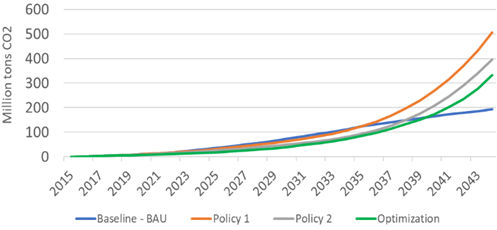ONEPlanET’s partners from UVa, leading the development of the ONEPlanET Model team, have achieved a significant milestone with the development of the energy module.
Within the framework of ONEPlanET, significant progress has been made in the development of the Water, Energy, Food, and Socio-economic modules led by ONEPlanET partners from University of Valladolid. During the recent General Assembly in Paris, African and European team members discussed integration plans for these modules, focusing on their successful integration.
The model has been carefully calibrated and validated using national data from Tanzania, allowing for a better understanding of the dynamics of energy systems in developing countries. With energy demand anticipated to rise due to economic and population growth, this work is especially relevant. The complexities involved in transitioning to renewable energy sources introduce additional layers of uncertainty that we are committed to addressing.
The System Dynamics model that has been developed in ONEPlanET simulates Tanzania’s electricity sector, providing valuable insights for decision-makers. It evaluates various energy expansion policies, considering their impacts on energy security, environmental sustainability, and economic factors. Key aspects include greenhouse gas emissions, investment needs, operational and maintenance costs, and the energy generation capacity mix.
Preliminary results are presented in Figure 1, which analyzes cumulative direct emissions across four different scenarios. The “Business as Usual” scenario, shown in blue, predicts emissions for 2044 based on Tanzania’s historical trends over the past two decades. Two policy scenarios are examined: Policy 1, which follows the Power System Master Plan 2020 (PSMP 2020) energy policy, and Policy 2, which focuses on achieving a 51% share of renewable energy. Both scenarios are assessed within the framework of Tanzania’s economic growth projections outlined in the Ministry of Energy’s Agenda 2020.
The scenarios explored include:
Business as Usual (Figure 1) – Projects cumulative emissions by 2044, assuming Tanzania continues its current trajectory.
Policy Scenario 1 (PSMP 2020) – Implements Tanzania’s Power System Master Plan 2020, highlighting potential shifts in energy use and emissions.
Policy Scenario 2 – Emphasizes a high-renewable energy share of 51%, aligning with national growth forecasts in the Ministry of Energy’s Agenda 2020. 
Additionally, the model has been used to optimize the long-term energy capacity mix, carefully balancing economic, environmental, and energy priorities. The policy resulting from this optimization, shown in green, offers promising improvements over the previous scenarios.
Furthermore, we are pleased to announce that the energy module developed by the University of Valladolid team at ONEPlanET has been accepted for presentation at the 2024 IEEE International Conference on Industrial Systems and Processes (SPIn). This achievement underscores ONEPlanET’s commitment to tackling energy planning challenges in developing regions.
